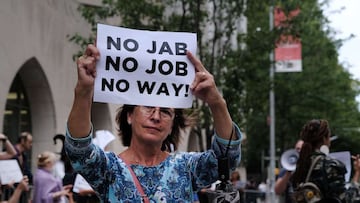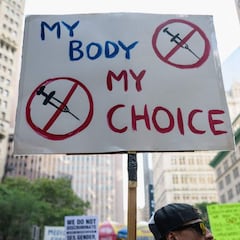What religious exemptions are there for covid-19 vaccinations?
The number of US employers requiring their staff to be vaccinated is on the rise but some workers are using Civil Rights legislation to exempt themselves from getting the shot.


As the number of states, businesses and local authorities requiring that their employees get vaccinated continues to rise, the issue of religious exemptions from the covid-19 vaccines will become more prominent.
Data released by multinational advisory and insurance firm Willis Tower Watson on Wednesday suggests that 52% of employers surveyed may have a vaccine mandate imposed before the end of 2021. This is more than double that 21% who currently have vaccination requirements and could have huge consequences for the 10 million workers employed by the 1,000 employers included in the study.
So what are religious exemptions, and how are they proved and assessed?
Exemption loophole comes from Civil Rights Act
The Civil Rights Act of 1964 is known as a landmark piece of social justice legislation, most commonly associated with the removal of ‘Jim Crow’ laws which were responsible for racial segregation in parts of the United States. The language of the Act prohibits “discrimination on the basis of race, color, religion, sex or national origin.”
Those seeking to use a religious exemption against a covid-19 vaccine mandate contend that employees are discriminating against their religious beliefs by requiring them to get vaccinated. Under Title VII of the Act, the Equal Employment Opportunity Commission has said that employers should accommodate workers’ “sincerely held” beliefs, provided that doing so poses no undue hardship on the employer.
From #NBA75:
— Duane Rankin (@DuaneRankin) August 28, 2021
NBA and National Basketball Referees Association have agreed to vaccinations for all refs working NBA games this 2021-22 season.
Must be fully vaccinated unless they have "a religious or medical exemption." pic.twitter.com/GDznCfFUFn
However at this stage no leaders of a major religion have supported the use of religious exemptions against the coronavirus vaccine. In August Pope Francis released a statement encouraging followers to get vaccinated, describing getting the vaccine as “an act of love - love for oneself, love for our families and friends and love for all peoples."
However despite the advice of religious groups like the National Association of Evangelicals, websites have begun appearing offering information on how to claim a religious exemption. Some provide online templates with which to submit these requests and coaching on how to evade covid-19 prevention efforts.
Most troublingly, some unscrupulous individuals have started offering written exemptions in return for cash. One self-described Evangelist was caught by a CBS Chicago reporter offering religious exemption letters for $25, saying: “you may not adhere to the tenets of this specific faith, I’m not gonna ask questions. It’s not for me to ask questions.”
The COVID-19 vaccine mandate for New York’s healthcare workers will no longer allow exemptions for religious reasons, state officials ruled. https://t.co/k3PPw0CHn5
— Modern Healthcare (@modrnhealthcr) August 30, 2021
How are religious exemptions assessed?
Given how new these debate are the actual process behind granting religious exemptions is still very vague. Typically, those looking for an exemption would provide a letter from a faith leader and the employer would then be entitled to ask for proof of a religious belief to support the claim.
Related stories
However beyond that the process is still unclear. The Rush University Medical Center in Chicago has introduced a committee to assess and decide on religious exemption requests. According to Slate the US military is in the process of forming a panel which will examine individual claims, with chaplains to be included in decision-making, but few other employers will have the resources to implement something similar.
Given the myriad difficulties associated with judging the validity of a religious exemption request most employers have so far declined to test the boundaries of the law, allowing workers to choose not to get the vaccine. However if any do decide to challenge an employee’s religious exemption the matter could soon end up in the courts.

